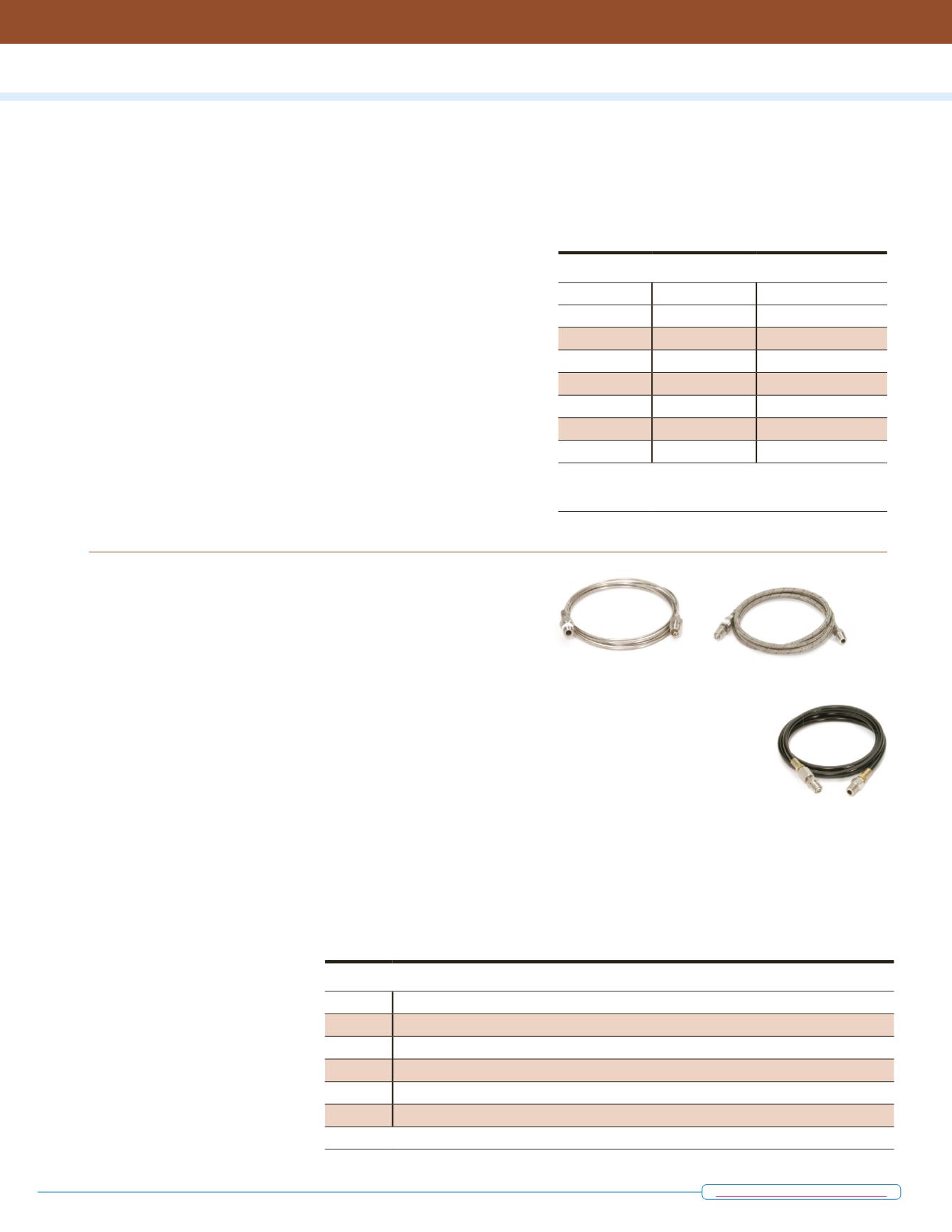
118
P a r r I n s t r u m e n t C o m p a n y
Thermocouples
P
arr offers a variety of ther-
mocouples for use in our
reactors and pressure vessels.
The “standard” thermocouple
is a Type J (iron-constantan)
which is well suited to the
operating temperature range
of these vessels. Other
materials as well as platinum
resistance (RTD) elements are
available as special orders.
These thermocouples are
sealed in 1/8" diameter stain-
less steel sheaths and have a
standard plug connection at
the end of the probe.
These thermocouple assem-
blies can either be sealed
directly into the head of the
vessel using a male connector
with an 1/8" NPT thread or
Type J Thermocouples with 1/8" Diameter
Part Number
Stem Length, in.
Sheath Material
A472E
7.5
T316 Stainless Steel
A472E2
9.5
T316 Stainless Steel
A472E3
11.5
T316 Stainless Steel
A472E6
15.5
T316 Stainless Steel
A475E5
21.5
T316 Stainless Steel
A472E4
5.5
T316 Stainless Steel
A472E8
2.5
T316 Stainless Steel
Most of the above listed thermocouples are also available as
Type K (Chromel-Alumel).
inserted into a protective well.
Thermowells are used on
larger vessels to protect the
thermocouple from physical
damage and on all vessels of a
corrosion resistant alloy other
than stainless steel.
Dual element thermo-
couples with two separate
thermocouples in a single
sheath and spring loaded
thermocouples designed to be
installed through the heater to
the outside wall of the vessel
are also available.
Thermocouples should be
approximately four inches
longer than the depth of the
vessel so that a smooth bend
can be made at the top to clear
other head fittings.
Pressure Hose
The A470E2 extension wire is
used to connect the thermocouple
to the control or readout device.
The standard length is six feet, but
longer lengths are available.
T
hree different pressure hose
assembles are available for
high pressure gas connections
to both stirred and non-stirred
vessels. The standard hose
is a 6 foot length with a male
“A” socket connector on one
side and a 1/8" NPT (M) nipple
with a 1/4" NPT (M) bushing on
the other end. The “A” socket
side of the hose attaches to
couplings installed on the inlet
valve of all stirred reactors as
well as to a side port of the
gage block assembly for the
non-stirred vessels. The choice
of either 1/8" NPT or 1/4" NPT
on the opposite end of the
hose allows for attachment to
most gas tank valves, pressure
regulators or other gas supply
sources.
The A495HC Hose Assembly
is made of nylon. It is rated
for 2500 psi and is very flex-
ible and easy to use with dry,
non-corrosive gases (nitrogen,
hydrogen and oxygen). Care
must be taken to ensure that
the nylon hose does not come
in direct contact with any
hot surfaces on the vessel or
heater. One of these hoses is
included with each complete
Parr Series 4500, 5100, and
5500 Stirred Pressure Reaction
Apparatus.
The A490HC Hose Assembly
is a braided, stainless steel
hose with a PTFE lining, rated
for 2500 psi. It is reasonably
flexible and recommended for
use with corrosive gases and
liquids, and for applications
requiring additional abra-
sion resistance, but it is not
intended for high temperature
liquids or gases.
The A506HC Assembly is a
6-foot length of 1/8" OD stain-
less steel tubing, rated for 7500
psi. This small diameter tubing
Pressure Hose
A495HC Pressure hose assembly, 6-ft, reinforced Nylon
A495HC5 Pressure hose assembly, 6-ft, reinforced Nylon, with non-return valve
A495HC7 Pressure hose assembly, 10-ft, reinforced Nylon
A490HC Pressure hose assembly, 6-ft, PTFE-lined, braided stainless steel
A490HC5 Pressure hose assembly, 6-ft, PTFE-lined, braided stainless steel, with non-return valve
A506HC Gas tube assembly, 6-ft, 1/8" OD, T316SS
Alternate lengths available upon request.
A506HC
Hose Assembly
A490HC
Pressure Hose
A495HC
Pressure Hose
is “bendable”, but it is not as
flexible as the other hoses. It
is recommended for corrosive
gases, high temperature trans-
fers and other high pressure
applications. Special versions
of this assembly can be made
of other corrosion resistant
materials. Larger tubing can be
used, but it is rigid rather than
flexible.
Special hoses with different
lengths or end fittings can be
assembled for special orders.


